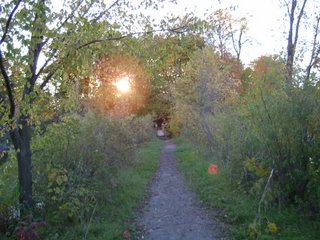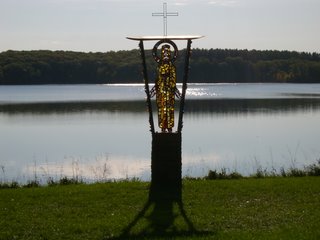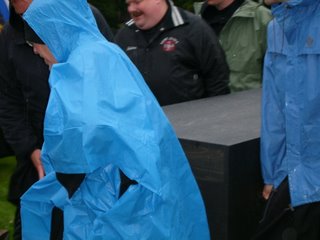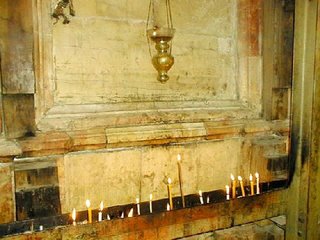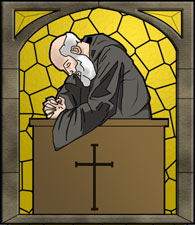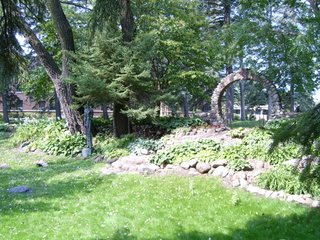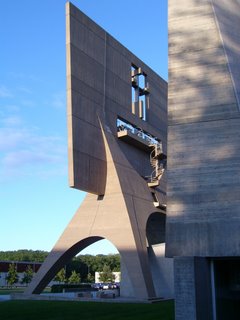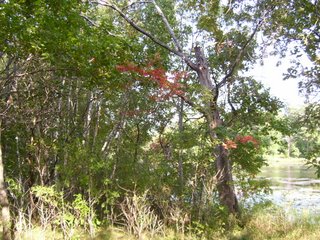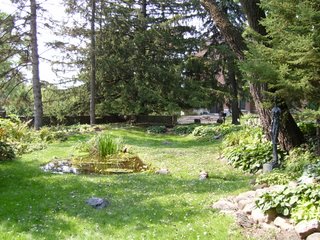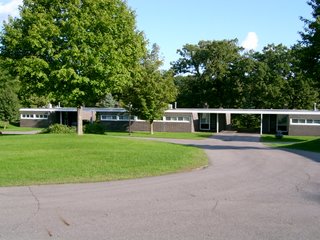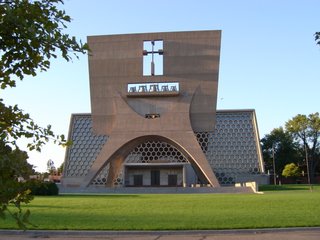Friday Night in the Big Town
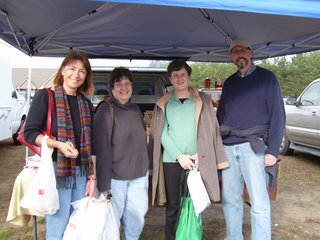
It's Homecoming at St. John's this weekend and red is everywhere. Some 12,000-13,000 spectators are expected at this afternoon's football game and people are carefully guarding their parking spaces. The colors have peaked--all too quickly, it seems to me. One day we were at about 25% color and, the next thing you knew, voila--there was color everywhere. The quick onset of cool weather probably adds to this--something quite different than the slow descent into cooler temperatures at home in southern Illinois. But even that is subject to change. A rather odd jump in temperatures is predicted for the next few days, swelling us to eighty-degrees fahrenheit by Monday.
As the week came to an end, we hard-working sabbaticants decided to head for the Farrmers' Market which is open late Friday afternoon. The number and variety of vegetables has sharply declined (though the Yak meat and jerkey is still available!). Potatoes, mushrooms, and a few tomatoes are still available, but the honey and maple syrup vendors have replaced most of the greens that lined the tables just a few weeks ago. Fortunately, bakers do their work twelve months a year and the sourdough I love so much (not to mention those delectable croissants) continue to be hawked to the small throng that swells in front of that irresistable table lined with enough carbohydrates to sink a battle ship.
The highlight of the evening, however, was an evening of choral and instrumental music hosted by the various school music groups: the Abbey Schola, Brass Ensemble, Campus Singers, Chamber Choir, and Men's Chorus, along with the Amadeus Chamber Symphony. The biggest difference between a St. John's concert and a Greenville production is the minimalist approach taken to amplification. The only microphones I saw were several radio mikes in the center aisle in order to broadcast, I suppose, the concert. At Greenville, I am always concerned that someone is going to be injured or killed by a speaker avalanche or that blood will coming pouring out of our ears because of enough decibels to drown out a 747 jet. The exception, of course, is when Dr. Wilson and the A Capella Choir sing. Then I can truly relax and enjoy.
The evening was framed by two Ralph Vaughan Williams' sing-a-long numbers: "For All the Saints (all eight verses!) and "All People that on Earth do Dwell" (set to the familiar "Old Hundredth" tune). There was an unusual Francis Poulenc (1899-1963) concerto that featured Kim Kasling pulling out all the stops on the organ and several nice pieces by the Brass Ensemble (kudos to Dale White for his work with these young people). I found the most moving to be an elegy by Robert Washburn (1928- ) that allowed the strings to sing. It was filled with subtle passion and allowed the chamber orchestra to stretch their wings.
As usual, I kept my eye on the percussionists--both of them. They performed admirably. The young fellow on the timpani carefully tuning and retuning, while making sure that the drums did not continue to ring past their appropriate time. The short young woman carefully bringing the cymbals together to avoid the inevitable "whoosh" of suction power that prevents the sound from ascending. At one point they had to move up into the choir and then haul all of their equipment back down for the Missa de Angelis. Ah, how well I remember those days! Sometimes the tympani would even lose their pitch in the process of moving and one has to be careful to restore them to their appropriate tone--all in the space of just a few moments. There's nothing like tympani about a half-step off to produce a curdled look on the conductor's face (not that that ever happened to me).
It is clear that music is at the heart of the St. John's experience and that the choice of music is, once again, partly determined by the Benedictine spirit. I think it important to ground decisions about academic programs in the values of the community. I appreciate the breadth of music that is available at my institution--though I find that the quality varies from group to group (as one might expect). My biggest concern is that we produce musicians (people who can read music, with a sensitivity to appropriateness based on venue and context). It is quite interesting to me that students oftentimes want more "worship" in chapel, which I always understand in an historical context. But, for whatever reason, "worship" for a lot of them means "popular Christian music." How is it that so many evangelicals have allowed music, which was originally a liturgical tool, to overshadow the liturgy, particularly the centrality of Word and Sacrament, itself? If I have a "mission from God," it is to help all of us in our institution understand the value of worship for worship's sake: not just so that individuals can walk away with some kind of spiritual "buzz".
